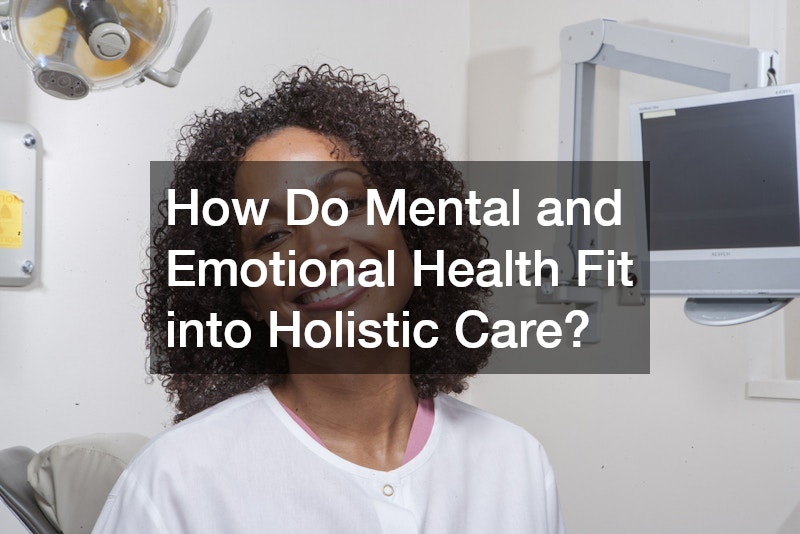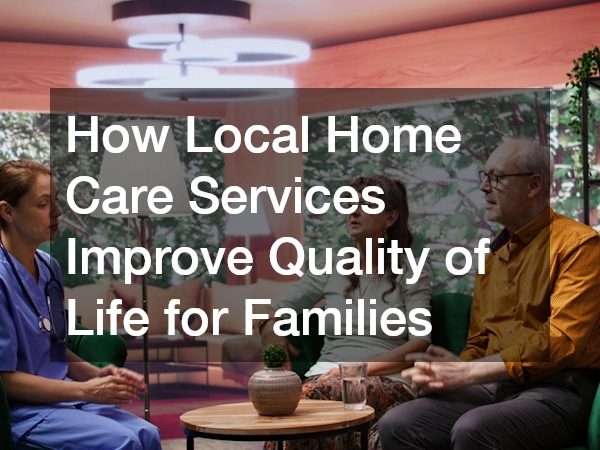The concept of a holistic approach to healthcare is about viewing and treating individuals as whole entities rather than merely symptoms and diseases. Its origins date back to ancient traditions where mental, emotional, and physical aspects were considered interconnected. Embracing holistic health care is increasingly significant in our modern world where personalized and comprehensive care is essential.

What Is It?
At its core, a holistic approach involves understanding individual’s lifestyle, emotions, and overall well-being in addition to their physical health. By focusing on multiple facets, holistic health care aims to provide a more comprehensive form of treatment. This approach differs from traditional practices.
Healthcare professionals, like a local physician, are increasingly incorporating holistic practices to enhance patient care. The integration of different therapies illustrates the adaptability of holistic methods in diverse medical fields. An urgent care clinic may also utilize holistic approaches for conditions that require quick and thoughtful resolutions.
Holism emphasizes the necessity of addressing root causes rather than just symptoms, meaning patients receiving a holistic approach to healthcare are likely to experience more sustainable well-being improvements. This perspective can often incorporate complementary practices such as diet modification, stress management, and exercise routines. Holistic medicine challenges both patients and practitioners to think broadly about health interventions.
How Does Holistic Healthcare Incorporate Wellness?
Holistic healthcare inherently includes a significant focus on wellness practices that promote long-term health benefits. Incorporating proper nutrition, exercise, and stress reduction techniques is key. Wellness is considered just as important as treating diseases and symptoms themselves.
Providers work towards achieving overall wellness in their patients. A gynecologist, for instance, might recommend dietary changes alongside conventional treatments for her patients’ specific needs.
The role of wellness in holistic frameworks is to complement medical treatments and provide preventive measures. Encouraging lifestyle alterations that boost immune functions and mental health becomes integral in such an approach. This promotes a patient’s resilience to diseases and augments their healing processes naturally.
What Are the Key Practices in Holistic Medicine?
Holistic medicine encompasses various key practices, such as traditional therapies, alternative treatments, and modern medical methods. Common interventions include acupuncture, homeopathy, and nutritional counseling, all under the banner of the holistic approach to healthcare. These treatments aim to address the full spectrum of health determinants influencing patients.
Incorporating these practices can often mean implementing personalized treatment plans tailor-made to fit the individual needs of the patient. Each method has its time and place, as a foot doctor might complement physical interventions with stress-reducing practices for better outcomes. Collaboration between professionals, such as those in therapy and a local orthopedic doctor, is encouraged to maximize patient care.
Holistic health care also includes innovative techniques like mobile IV therapy services, which offer convenient access to hydration and nutrient support. Using various practices allows for flexible treatment plans that can adapt according to the patient’s condition. For many people seeking holistic health, these integrative strategies can provide relief and improvement across health areas.

How Do Mental and Emotional Health Fit into Holistic Care?
Addressing mental and emotional health is fundamental in holistic care as these aspects directly impact physical well-being. Providers focusing on a holistic approach to healthcare recognize the influence psychological states have on a person’s overall health. Symptoms of anxiety or depression can affect treatment outcomes, making mental health considerations crucial.
Incorporating mental and emotional health strategies may involve therapy sessions, stress management techniques, or meditation. Collaborating with various professionals, including therapists and local physicians, helps ensure a well-rounded approach. By integrating these elements, holistic healthcare practitioners aim to foster environments where mental health receives equal attention as physical ailments.
The holistic framework supports emotional intelligence alongside resilience as a component of comprehensive care. It prompts continuous adaptation of care plans with respect to patients’ evolving mental health conditions. In essence, attention to mental and emotional well-being is indispensable for achieving true holistic health.
What Role Do Healthcare Providers Play?
Healthcare providers have a significant role in implementing holistic approaches; they must adapt traditional and integrative methods tailored to patients’ needs. Providers like gynecologists and chiropractors must possess a deep understanding of both conventional treatments and alternative therapies. The holistic approach to healthcare methodologies challenges them to maintain open lines of communication with patients about their overall lifestyle.
Providers need to actively engage their patients in their healthcare journey, fostering trust and encouraging adherence to holistic practices. Each healthcare provider is responsible for acknowledging the interconnectedness of mental, physical, and emotional health. They should continually evaluate and adjust treatment plans within a holistic framework to optimize patient outcomes.
Furthermore, healthcare providers should work collaboratively, exchanging insights and expertise to ensure patients receive comprehensive care. This interprofessional cooperation extends to everyone’s duty to advance holistic healthcare practices. A holistic approach embodies collective efforts in understanding and delivering better health solutions.
How Is Patient Education Important in Holistic Healthcare?
Patient education is a core component of holistic healthcare, empowering individuals with knowledge and tools to manage their health. In holistic health care, educating patients about nutrition, exercise, and stress management is crucial for fostering self-reliance and informed decisions. Techniques are vital for motivating patients to adopt and adhere to personalized health strategies.
Well-educated patients can make more informed choices about their health, understanding how various lifestyle factors impact their overall well-being. They become active participants in managing their conditions and in implementing holistic approach to healthcare approaches in their daily routines. Patient education can make the difference between temporary relief and long-lasting health improvements.
When healthcare providers invest time and resources into educating their patients, it fosters better communication and a stronger provider-patient relationship. An educated patient is more likely to engage in preventative measures and partake in regimens such as mobile IV therapy services. This approach emphasizes that patient education leads to better, longer-term health outcomes by increasing the possible benefits of holistic healthcare.

What Are the Benefits of a Holistic Healthcare Approach?
Holistic healthcare offers numerous benefits, including enhanced individualized care, and a comprehensive understanding of health determinants. By addressing all facets of health, the holistic approach to healthcare ensures the treatments focusing on the root cause of issues yield long-term benefits. Patients receive care tailored to their personal needs and lifestyle, improving adherence and outcomes.
This approach reduces relapses and incidences of chronic conditions by emphasizing prevention and equilibrium in body systems. For example, a gynecologist using holistic healthcare principles might suggest alternative pain management techniques and lifestyle changes in addition to traditional treatments. This can reduce reliance on medication and enhance the quality of life.
The integrative nature of holistic healthcare also supports interdisciplinary approaches and patient collaboration, leading to a broadened treatment perspective. Patients using holistic methodologies receive wider access to various therapies, including those offered by chiropractors and local orthopedic doctors, broadening their options for healthcare. These benefits demonstrate holistic care’s potential to transform the healthcare landscape positively.
What Challenges Does Holistic Healthcare Face?
Despite its benefits, the holistic approach to healthcare faces various challenges, including skepticism from mainstream medical professionals. Some perceive holistic methods as unscientific or lacking evidence-based validation.
Funding and resource allocation can pose additional barriers, as holistic treatments may not be covered by insurance policies. Sustainability within these practices also requires ongoing research and evidence gathering to validate alternative and complementary therapies. Overcoming these challenges is crucial for the holistic healthcare model to gain wider recognition and support.
Raising awareness and fostering open dialogues between conventional and alternative providers could bridge existing gaps. Addressing these challenges head-on is imperative for the future growth and acceptance of holistic practices.
How Can Holistic Healthcare Be Tailored to Individual Needs?
Holistic healthcare revolves around customization, ensuring treatments cater to the unique needs of individuals. By considering factors such as a patient’s lifestyle, genetics, and preferences, practitioners can devise holistic approach to healthcare strategies effectively. The adaptability of holistic health care is integral to its effectiveness in addressing various patient concerns.
Healthcare providers utilize in-depth consultations to understand patients’ comprehensive health background, including their mental and emotional well-being. This provides a complete picture, enabling them to formulate tailored treatment plans combining diet, exercise, and therapy. An individualized approach acknowledges that every patient is different, with distinct responses to holistic interventions.
Personalization involves a collaborative effort, where practitioners work alongside patients to adapt recommendations as needed. As patients evolve, so too can their healthcare plans through ongoing assessment and refinements. These methodologies emphasize the importance of individualized care plans, facilitating sustained health and well-being improvements.

How Does Technology Influence Holistic Healthcare?
Technology plays a pivotal role in enhancing the reach and effectiveness of holistic healthcare. Digital innovations enable healthcare practitioners to provide mobile IV therapy services, offering flexibility and convenience for these treatments. These technologies help expand healthcare access and patient engagement across different settings.
Technology also fosters improved communication between healthcare providers and patients, ensuring comprehensive monitoring and support. By utilizing telehealth and wearable health devices, patients can track and manage their own wellness goals in alignment with holistic approach to healthcare guidelines. These advancements empower greater patient involvement and adherence.
Overall, technology integration supports the growth of holistic health care practices, driving change towards more accessible and adaptable healthcare. The future holds further potential for fusing technological innovation with holistic principles, propelling a holistic approach to wider audience appreciation and usage. By breaking geographical and logistical barriers, technology is paramount in holistic healthcare advancement.
How Can I Find Holistic Healthcare Professionals?
Finding holistic healthcare professionals involves a few key steps to ensure you choose someone who aligns with your health goals. Start by researching local practitioners who offer treatments such as acupuncture, chiropractic care, naturopathy, or integrative medicine. Online directories, like the American Holistic Health Association (AHHA) and the National Center for Complementary and Integrative Health (NCCIH), provide a great starting point. These directories often include certified practitioners with specific credentials in holistic care.
Next, ask for recommendations from friends, family, or community groups focused on wellness. Word-of-mouth referrals can provide insight into a practitioner’s methods and bedside manner. It’s also important to check a practitioner’s credentials and reviews. Look for certifications and experience in the specific area of holistic care you seek. Reading online reviews can give you a better understanding of other patients’ experiences. Schedule a consultation to assess if the practitioner’s philosophy aligns with yours. Holistic healthcare emphasizes treating the whole person, so it’s crucial to feel comfortable with your practitioner’s approach to integrative treatments that address both physical and emotional well-being.
What Characteristics Should I Look for in Holistic Healthcare Professionals?
When choosing a healthcare professional, it’s essential to find someone who aligns with your wellness goals and offers comprehensive, patient-centered care. A key characteristic to look for is a holistic approach. A qualified practitioner should focus on treating the whole person, considering physical, emotional, and spiritual aspects, rather than just addressing individual symptoms. This emphasis on overall well-being promotes long-term health and prevention.
It’s also crucial to ensure that the professional has proper credentials and experience in the specific area of holistic healthcare you are seeking, whether it’s naturopathy, acupuncture, or rosacea therapy. Certifications and relevant experience with conditions similar to yours can provide confidence in their ability to help you.
Additionally, personalized care is an important trait of a great holistic healthcare professional. They should take the time to understand your unique health concerns and tailor treatment plans specifically to your needs. This individualized attention can foster a more effective healing process, ensuring that your health is approached from a comprehensive, integrative perspective.
A holistic approach to healthcare embodies a comprehensive understanding of human health, interconnecting physical, mental, and emotional aspects. By embracing wellness and prevention strategies, we unlock the potential for more sustainable health improvements. The holistic framework offers significant advantages, urging mainstream healthcare systems to further explore and incorporate these practices.






